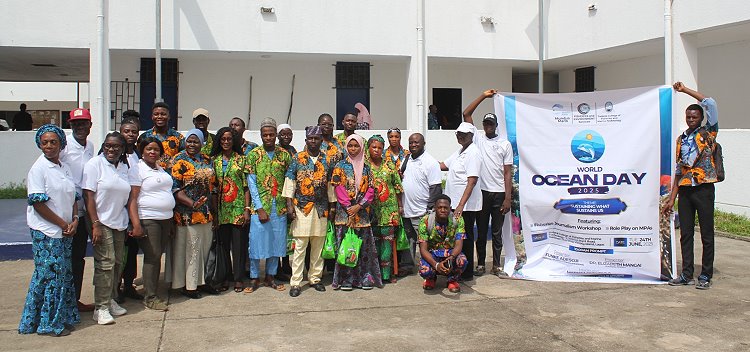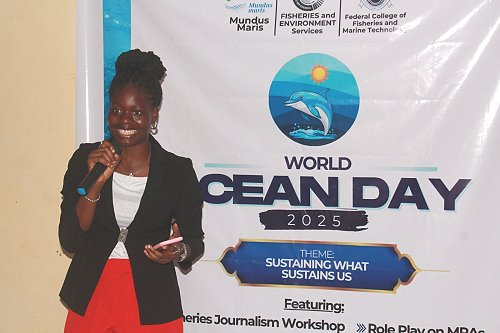 Der Workshop fand am 24. Juni 2025 zwischen 11:00 und 14:00 Uhr in den Räumlichkeiten des Federal College of Fisheries and Marine Technology (FCFMT) in Bar Beach Stop, Victoria Island, Lagos, statt. Er wurde gemeinsam von Mundus maris und Fish Party aus Anlass des Welt-Ozeantags organisiert.
Der Workshop fand am 24. Juni 2025 zwischen 11:00 und 14:00 Uhr in den Räumlichkeiten des Federal College of Fisheries and Marine Technology (FCFMT) in Bar Beach Stop, Victoria Island, Lagos, statt. Er wurde gemeinsam von Mundus maris und Fish Party aus Anlass des Welt-Ozeantags organisiert.
Die Veranstaltung stand unter dem Motto „Sustaining What Sustains Us” (Das erhalten, was uns erhält) und stand damit im Einklang mit dem diesjährigen Motto der Vereinten Nationen zum Welt-Ozeantag.
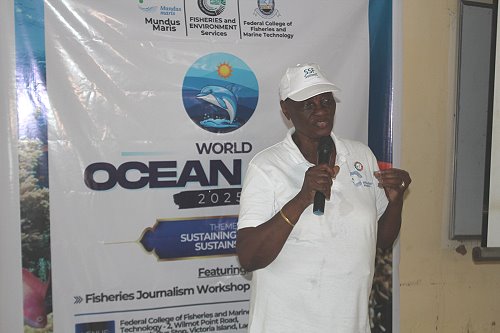 Ziel war es, den Teilnehmern grundlegende Kenntnisse im Bereich Fischerei-Journalismus zu vermitteln und durch ein interaktives Rollenspiel ein tieferes Verständnis für die Bedeutung von Meeresschutzgebieten (Marine Protected Areas, MPAs) zu fördern.
Ziel war es, den Teilnehmern grundlegende Kenntnisse im Bereich Fischerei-Journalismus zu vermitteln und durch ein interaktives Rollenspiel ein tieferes Verständnis für die Bedeutung von Meeresschutzgebieten (Marine Protected Areas, MPAs) zu fördern.
Am Workshop nahm eine gemischte Gruppe von etwa 40 Teilnehmern teil, darunter Studenten der Fischerei, Jugendbotschafter, Beamte aus Landwirtschaftsministerien, sowie Nichtregierungsorganisationen (NGOs), Fischer aus den Küstengemeinden von Lagos und Vertreter des Trawlerverbands.
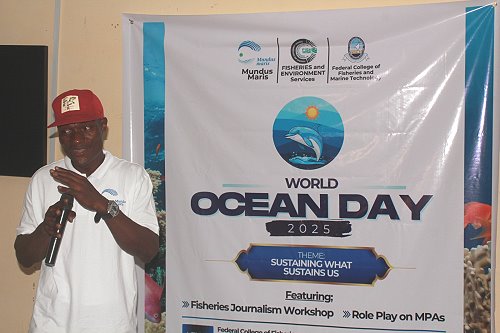 Die Moderatorin Mariam Adegbola startete den Workshop mit einer herzlichen Begrüßung (erstes Foto oben).
Die Moderatorin Mariam Adegbola startete den Workshop mit einer herzlichen Begrüßung (erstes Foto oben).
Die Eröffnungsreden hielten Professor Stella Williams als Vertreterin von Mundus maris und Idowu Hunyinbo als Vertreter von Fish Party.
Beide Redner betonten die entscheidende Bedeutung der Gesundheit des Ozeans und die Notwendigkeit gemeinsamer Anstrengungen zu deren Verbesserung als Voraussetzung für den Erhalt nachhaltiger Meeresressourcen für künftige Generationen.
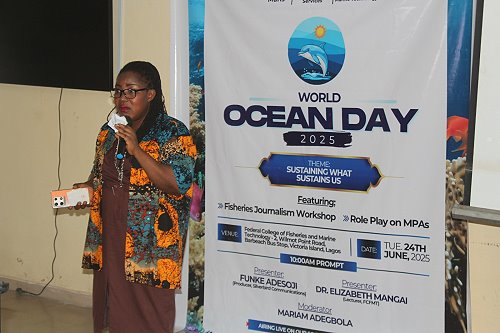
Frau Funke Adesoji, Medienberaterin
Die erste Sitzung, die von Frau Funke Adesoji, Produzentin, Silverbird Communications, geleitet wurde, konzentrierte sich auf die entscheidende Bedeutung des Journalismus bei der Förderung der nachhaltigen Fischerei und der Darstellung der Auswirkungen auf die Gemeinschaft.
Frau Adesoji gab praktische Anleitungen zur Erstellung wirksamer journalistischer Inhalte, insbesondere unter Verwendung alltäglicher Mittel. Zu den wichtigsten Erkenntnissen aus diesem Segment gehörten:
Bildhafte Erzählweise: Den Teilnehmern wurde empfohlen, bei Foto- und Videoaufnahmen das Querformat dem Hochformat vorzuziehen, um eine umfassendere und professionellere Bildsprache zu gewährleisten.
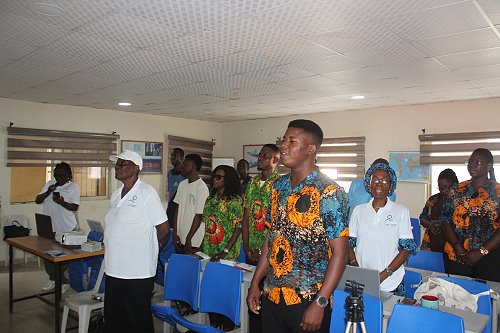 Audioqualität: Es wurde betont, wie wichtig eine ruhige und stille Umgebung für klare Audioaufnahmen ist, da eine saubere Geräuschkulisse die Botschaft verstärkt.
Audioqualität: Es wurde betont, wie wichtig eine ruhige und stille Umgebung für klare Audioaufnahmen ist, da eine saubere Geräuschkulisse die Botschaft verstärkt.
Beleuchtung: Die perfekte Beleuchtung wurde als wesentlich für die Erstellung hochwertiger Bilder hervorgehoben, die die beabsichtigte Botschaft effektiv vermitteln.
Inhaltlicher Schwerpunkt: Bei der Sitzung wurden die Teilnehmer aufgefordert, sich auf nachhaltige Fischereipraktiken, die Bedeutung der Medien bei der Überzeugungsarbeit und die greifbaren Auswirkungen auf die Fischereigemeinden zu konzentrieren.
Veröffentlichung: Die Teilnehmer wurden angeregt, ihre journalistischen Berichte an Mundus maris und Fish Party weiterzugeben, wobei der Schwerpunkt darauf lag, diese Berichte auch an den Umweltjournalisten von Silverbird Communications weiterzuleiten, um eine breitere Öffentlichkeit zu erreichen.
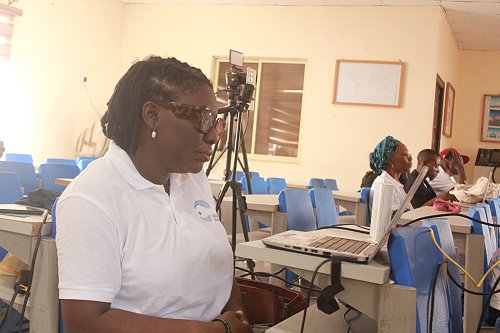
Dr Abiodun-Solanke, Moderatorin des Rollenspiels
Dr. Elizabeth Mangai, Dozentin an der FCFMT, hielt einen aufschlussreichen Kurzvortrag über die Bedeutung von Meeresschutzgebieten (MPA). Sie erläuterte, dass MPAs wichtige Instrumente für den Erhalt der biologischen Vielfalt im Meer sind, die Erholung von Fischpopulationen ermöglichen und letztendlich die Resilienz von Meeresökosystemen verbessern.
Im Anschluss an den Kurzvortrag nahmen die Teilnehmer an einer interaktiven Gruppenarbeit teil. In gemeinsamer Arbeit wählten sie auf einer Karte hypothetische Standorte für MPAs aus, legten die Verantwortlichkeiten für deren Verwaltung fest und ermittelten Schlüsselindikatoren für den Erfolg. Diese praxisnahen Übungen förderten ein tieferes Verständnis für die konkreten Überlegungen, die mit der Einrichtung und dem Management von MPA verbunden sind.
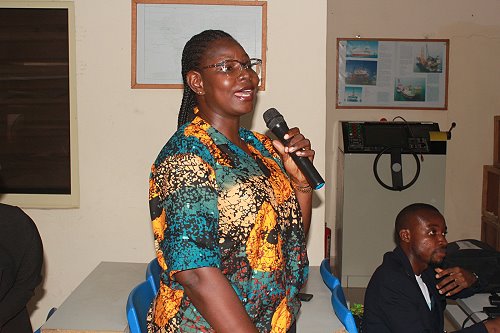
Teilnehmerin als Vertreterin einer NGO
Der Höhepunkt des Workshops war das interaktive Rollenspiel mit dem Titel „Saving Our Seas Together“, das von Dr. Abiodun-Solanke moderiert wurde. Diese lebhafte Veranstaltung simulierte ein Szenario mit Konflikt- und Managementdiskussionen innerhalb eines MPA-Kontextes und basiert auf der Arbeit von Mundus maris im Jahr 2024 mit dem Titel „Protecting Blue Horizons“, wie ein MPA in der Praxis funktionieren kann.
Die Teilnehmer, bestehend aus Fischereistudenten, Jugendbotschaftern, Beamten, Wissenschaftlern, industriellen Trawlern und handwerklichen Fischern, übernahmen bestimmte Rollen:
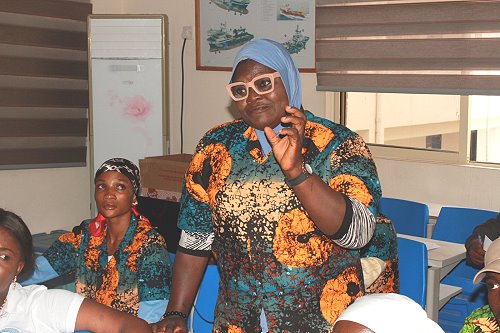
Die Vertreterin einer Fischerin aus der Küstengemeinde Epe
Die Wissenschaftlerin erläuterte die ökologischen Gründe für MPAs und deren Nutzen für die Erholung der Fischbestände.
Die handwerkliche Fischerin vertrat die Interessen der handwerklichen Fischer und die kulturelle Bedeutung der traditionellen Fischereipraktiken.
Der Industriefischer/Kapitän äußerte Bedenken hinsichtlich der Geschäftsabläufe und der Notwendigkeit von Anpassungsstrategien.
Die Beamtin konzentrierte sich auf das Gleichgewicht zwischen wirtschaftlicher Entwicklung, der Schaffung von Arbeitsplätzen und dem Schutz der Umwelt durch Genehmigungen, klare Regeln und Schutzmaßnahmen.
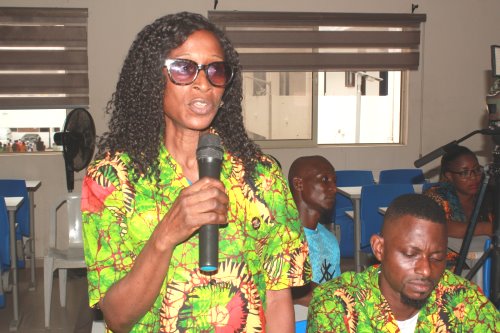
In der Rolle der Beamtin
Das Rollenspiel demonstrierte eindrucksvoll, wie verschiedene Interessengruppen, die oft konkurrierende Ansichten haben, verhandeln und auf gemeinsame Ziele hinarbeiten können. Die anschließende Nachbesprechung ermöglichte eine kritische Diskussion über die Ergebnisse und Erkenntnisse aus dem simulierten MPA-Konflikt.
Es wurde hervorgehoben, dass MPAs nur dann erfolgreich sind, wenn alle Stimmen an der Lösung mitwirken und die Zusammenarbeit gegenüber der Konfrontation im Vordergrund steht.
In einer moderierten Fragerunde konnten die Teilnehmer Fragen an die Referenten und Moderatoren stellen, was eine umfassende Diskussion über verschiedene Aspekte der Fischerei, des Journalismus und des Meeresschutzes ermöglichte.
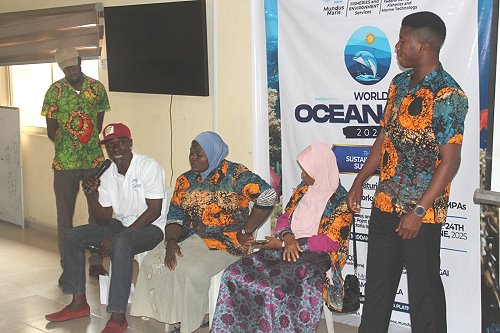
Während des Rollenspiels
Jeder Teilnehmer teilte eine wichtige Erkenntnis aus dem Workshop mit und verpflichtete sich zu einer bestimmten Massnahme. Diese Ideen wurden auf einem „Pledge Board“ festgehalten, um die Nachbereitung der Veranstaltung zu erleichtern und das weitere Engagement zu fördern.
Der Workshop endete mit zusammenfassenden Anmerkungen von Vertretern von Mundus maris und Fish Party. Die Teilnehmer wurden eingeladen, sich an einem fortlaufenden Online-Forum oder einer Plattform für Ressourcen zu beteiligen, um den Elan aufrechtzuerhalten und die weitere Zusammenarbeit zu fördern.
Der Workshop zum Weltozeantag 2025 war ein durchschlagender Erfolg, da er theoretisches Wissen mit praktischer Anwendung durch ansprechende Aktivitäten effektiv verband.
Die Sitzung zum Thema Fischerei-Journalismus vermittelte den Teilnehmern wertvolle Fähigkeiten für eine effektive Kommunikation, während das Rollenspiel eine realistische Simulation der komplexen Zusammenhänge bei der Bewirtschaftung der Meeresressourcen darstellte. Die vielfältige Beteiligung unterstrich das kollektive Engagement für „Sustaining What Sustains Us“ (Erhalten, was uns erhält) und ebnete den Weg für sachkundige und kooperative Maßnahmen zum Meeresschutz in Nigeria.
